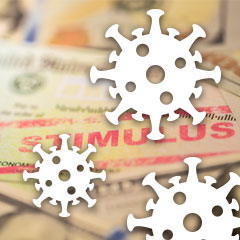COVID Relief Provisions that Can Lower Your Business Taxes
March 1, 2021 | IRS Regulation, Tax Planning, Tax Preparation
 After a most unusual, volatile and unprecedented year for Maine businesses, your finances — and tax situation — may be unlike any other “normal” year. Filing your business taxes can oftentimes be stressful, but with the economic hardships of the past year, it can be even more challenging. The silver lining is that there is some relief. The CARES Act, which was passed last year, included various tax relief provisions for business taxpayers. Here are four provisions that could impact your Maine-based business’s tax return.
After a most unusual, volatile and unprecedented year for Maine businesses, your finances — and tax situation — may be unlike any other “normal” year. Filing your business taxes can oftentimes be stressful, but with the economic hardships of the past year, it can be even more challenging. The silver lining is that there is some relief. The CARES Act, which was passed last year, included various tax relief provisions for business taxpayers. Here are four provisions that could impact your Maine-based business’s tax return.
Liberalized Net Operating Loss (NOL) deduction rules
Business NOLs that arose in tax years beginning in 2020 can be carried back up to five tax years. That means if your business reported a NOL on last year’s return, it can be carried back to an earlier year in order to regain some or all of the income tax paid that particular year. This could be especially helpful as taxes were generally higher in the years before the Tax Cuts and Jobs Act (TCJA) took effect in 2017. So NOLs carried back to the years prior to the TCJA can be particularly beneficial.
Faster depreciation for real estate QIP.
Qualified Improvement Property (QIP) is an improvement to an interior portion of a nonresidential building that’s placed in service after the date the building was first placed in service. The CARES Act provision allows 100% first-year bonus depreciation for QIP that was placed in service in 2020. Alternatively, you can depreciate QIP placed in service in 2020 over 15 years using the straight-line method.
Suspension of excess business losses
One of the downsides of the TCJA was a provision that ended deductions for “excess business losses” — a loss that exceeds $250,000 or $500,000 for a married couple that files a joint tax return. However, the CARES Act allows for this deduction for losses that arose in tax years beginning in 2020.
Increased limit on business interest expense deductions
Deductions for business interest expense was generally limited to 30% of adjusted taxable income (ATI) for tax years beginning in 2020. Any business interest expense that’s disallowed under this limitation is generally carried over to the following year. With the CARES Act — in most cases — business owners can deduct up to 50% of ATI for tax years beginning in 2020, allowing them to see savings more immediately. Businesses with average annual gross receipts of $25 million or less (adjusted for inflation) for the three previous tax years and, in certain cases, real property and farming businesses are exempt from this limitation.
There are some special rules for partnerships and limited liability companies (LLCs). And businesses with
Business interest expense that’s disallowed under this limitation is carried over to the following tax year. In general, the CARES Act increased the taxable income limitation to 50% of ATI for tax years beginning in 2020. Special complicated rules apply to partnerships and limited liability companies (LLCs) that are treated as partnerships for tax purposes.
Important: Businesses with average annual gross receipts of $25 million or less (adjusted for inflation) for the three previous tax years are exempt from the business interest expense deduction limitation.
Consult with a Tax Pro
There’s still time to make some last-minute, tax-saving actions to help your business. Contact Filler & Associates if you would like to work on some tax strategies that cater to your specific situation.
